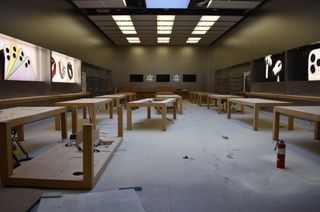Buying a used iPhone or iPad? This neat trick can help make sure it's not stolen from Apple.

What you need to know
- Multiple Apple stores have been looted in the U.S.
- Looters taking advantage of recent protests have cleaned out some Apple stores, including devices used for in-store display.
- You can use the IMEI number of a device to check it wasn't stolen from Apple, here's how.
A Reddit user has revealed a tip you can use to check if a "used" iPhone or iPad was stolen from Apple using its IMEI number.
The tip follows a week of protests, and sadly violence and looting across the U.S. in the wake of the killing of George Floyd in Minneapolis. Several Apple Stores in the country including the Minneapolis store have been targeted by looters, who have broken into stores and stolen accessories for sale and display devices used on the shop floor.
Apple's in-store display units are useless beyond the store's walls. They are imaged with special demo software which can be used to track the phones and disable them if they are removed from the store. However, that doesn't mean someone isn't likely to take advantage of looting to try and sell some of them on. So here's how to spot whether a phone or iPad was stolen from Apple.
The tip from Reddit users 3hitbye is very simple. If you run the IMEI number of a device that happens to be an Apple demo unit, there will be two very clear signs that it was stolen.
The first is the purchase date, which the poster notes will be an "impossible purchase date" like 1984, or some other such whack date. The second key indicator is a locked carrier status that reads "Chimaera/Blacklist Device Policy."
You can check this yourself on a couple of websites. The two attached to the post are iUnlocker and SickW. If you're about to purchase a second-hand device from someone, be extra cautious and ask for the IMEI number. If you run it and see either of those two key indicators, then you should stay well away from the device, and you might even want to report it to the authorities.
Finally, please note that these websites are unofficial and even a "negative" result on the above tests does not protect you from other potential issues, so where possible, you should absolutely try to buy used phones from reputable outlets.
Master your iPhone in minutes
iMore offers spot-on advice and guidance from our team of experts, with decades of Apple device experience to lean on. Learn more with iMore!

Stephen Warwick has written about Apple for five years at iMore and previously elsewhere. He covers all of iMore's latest breaking news regarding all of Apple's products and services, both hardware and software. Stephen has interviewed industry experts in a range of fields including finance, litigation, security, and more. He also specializes in curating and reviewing audio hardware and has experience beyond journalism in sound engineering, production, and design.
Before becoming a writer Stephen studied Ancient History at University and also worked at Apple for more than two years. Stephen is also a host on the iMore show, a weekly podcast recorded live that discusses the latest in breaking Apple news, as well as featuring fun trivia about all things Apple. Follow him on Twitter @stephenwarwick9
Most Popular




